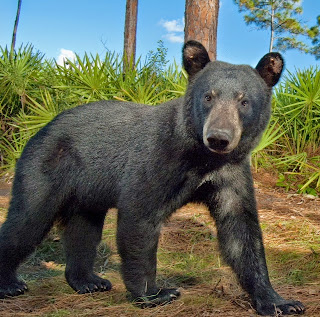Florida Wildlife Commission Decides No Black Bear Hunt in 2016
The Florida Fish and Wildlife Conservation Commissioners (FWC) on June 22 rejected the recommendation by FWC staff to hold a modified hunt this year and approved Option 3 of four considered, postponing the black bear hunt until 2017. Click here and scroll to page 8 for all four options considered.

It was good news for Florida black bears, and a major victory for environmental and animal rights activists. Sierra Club members joined thousands of Floridians who protested, made calls, and sent comments opposing the hunt.
The vote was 4-3. Voting in favor of postponing the hunt until 2017 were Ronald M. Bergeron, Brian Yablonski, Bo Rivard, and Robert A. Spottswood. Voting for a hunt this year were Aliese P. "Liesa" Priddy, Richard Hanas, and Charles W. Roberts III. Information about the Commissioners and how to contact them can be found at this link.
The FWC made it clear that it was delaying, not ending, its bear hunt in a news release following the vote. "Although the framework for bear hunting in Florida remains in place, there will be a zero hunt objective set for 2016 and the Commission could consider future bear hunting in 2017," said the FWC release.
Sierra Club Florida, representing 31,000 members from Pensacola to Key West, vigorously opposes hunting of Florida black bears. Sierra Club Florida joins millions of Florida citizens who are against the hunt.
We support the no hunt option being considered by the Florida Fish and Wildlife Conservation Commission.
The survival of the Florida black bear is threatened by destruction and fragmentation of its habitat, hundreds of road collisions, and a diminished food supply. Hunting doesn’t just reduce bear numbers. When added to the other threats faced by bears, it increases the risk of the bears' extinction.
In March, Sierra Club Florida joined the Center for Biological Diversity, several other organizations, and nationally-prominent conservation biologists in a petition to the U.S. Fish and Wildlife Service to list the Florida black bear as an endangered species. Our call to the federal government is to protect the bear from extinction, and our call to the state government is to provide more habitat to facilitate the full recovery of the black bear.
Last year we witnessed the heart-rending massacre of 304 Florida black bears over the course of just two days. FWC staff grossly miscalculated how easy it would be for hunters to find the bears and kill them. According to FWC's own report, 59 percent of the bears killed statewide were females, while 21 percent of those were lactating females. We reject the false promises offered that the hunt will be carried out in a more humane and measured manner this year.
We believe that the impetus for hunting in Florida comes from the development industry and its supporters in government, including Governor Rick Scott. It is no secret that the Governor and his developer friends want to build new roads and cities across the state. And it’s no accident that the majority of the members of the Florida Fish and Wildlife Conservation Commission appointed by Governor Scott have major employment or financial interests in the development industry.
The governor's master plan would double the human population in Florida over the next few decades and move the new inhabitants to the rural and wild heartland of the state. It would open up existing black bear areas to intense development, leading to more road collisions and more conflicts with bears. It is the opposite of what needs to be done. What’s needed is to use documentary stamp dollars mandated by the voters in approving Amendment One to acquire the land needed to restore the black bear’s habitat.
The only beneficiary to expanded development and destruction of the heart of wild Florida will be the greedy developers and the political leaders who feed off their trough. The rest of us will suffer a diminished quality of life and the tourist industry that serves as the backbone of Florida’s economy will decline as wild Florida disappears.
Last year, the FWC staff stated that the goal of the hunt was to reduce the number of Florida Black Bears to sustain its population and it wasn’t intended to resolve conflicts between humans and bears. We find that argument disingenuous. The demand for hunting was stimulated by bear-human conflicts, not overpopulation of the bears. It’s conflict reduction that’s needed, not a reduction of the number of bears, and there are several ways to do that. The best approach is to use Florida Forever funds to purchase land needed to restore the black bear’s natural habitat and to stop encroaching on that habitat through continued urban development and sprawl in Florida’s heartland. We also need to require bear proof garbage containers in residential communities adjacent to black bear areas, and we need to make sure that the bear’s food source in its natural habitat is plentiful and not threatened by human encroachment.
There are currently 4,000 black bears and 20 million people in the state of Florida. That’s 5,000 people for every black bear. Certainly we can find a way to protect this population of bears that is much, much smaller than our own. We can protect the bears and let them live in peace in their native homeland.
Florida Sierra Club urges the FWC to adopt the no hunt option — and to reject the other three options.